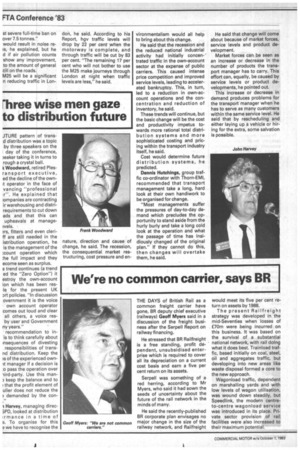We're no common carrier, says BR
Page 60

If you've noticed an error in this article please click here to report it so we can fix it.
THE DAYS of British Rail as a common freight carrier have gone, BR deputy chief executive (railways) Geoff Myers said in a discussion of the freight business after the Serpell Report on railway financing.
He stressed that BR Railfreight is a free standing, profit dependent, unsubsidised enterprise which is required to cover all its depreciation on a current cost basis and earn a five per cent return on its assets.
Serpell was something of a red herring, according to Mr Myers, who said it had sown the seeds of uncertainty about the future of the rail network in the minds of many.
He said the recently-published BR corporate plan envisages no major change in the size of the railway network, and Railfreight would meet its five per cent return on assets by 1988.
The present Railfreight strategy was developed in the mid-Seventies when losses of £70m were being incurred on this business. It was based on the survival of a substantial national network, with rail doing what it does best. Trainload traffic, based initially on coal, steel, oil and aggregates traffic, but developing into new areas like waste disposal formed a core to the new approach.
Wagonload traffic, dependent on marshalling yards and with low levels of wagon utilisation, was wound down steadily, but Speedlink, the modern centreto-centre wagonload service was introduced in its place. Private sector provision of rail facilities were also increased to their maximum potential.




































































































